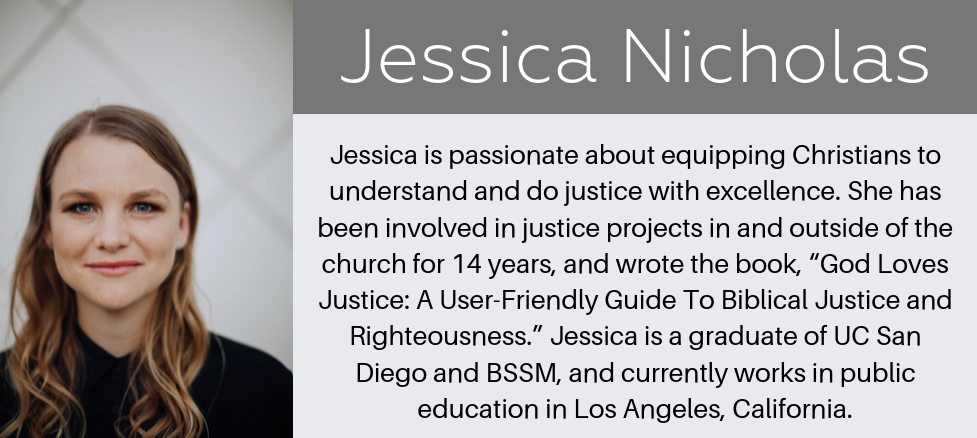God's Grief
A question that stuck with me when I first stared reading about justice in the Bible was: Why does God take justice and injustice so seriously? Is He like a law-obsessed ruler sitting on His far away throne, enjoying throwing lightening bolts at particularly sinful people? That fit the picture I had of Him when I was growing up. But it didn't explain His passion for justice I saw in the Bible, one that seemed profoundly tied to people and relationships.
Let’s go back to the beginning, to what I think is the most important part of thinking about justice: God’s own heart.
Within one generation of God making His good Creation, the first murder takes place- Cain killing Abel in a fit. It doesn't take long for humans to really mess everything up. A few generations after that, Noah was born into a world marked with corruption and violence. It didn’t take long to go from one single act of sin to: “the earth was corrupt in God's sight, and the earth was filled with violence [chamas] (Gen 6:6b, ESV).”
Now imagine what that must be like for God to experience- He created a perfect world, made man to cultivate His perfect earth, and these humans that He made in His own image were now hurting each other.
God’s emotional response to this violence is key:
Then the Lord saw that the wickedness of man was great on the earth, and that every intent of the thoughts of his heart was only evil continually. The Lord was sorry that He had made man on the earth, and He was grieved in His heart. (Gen 6:5-6, ESV)
What’s in man’s hearts? Unending evil thoughts. And what happened in God’s heart as a response? Grief.
This is the only emotion that’s attributed to God in the whole book of Genesis- and it is pain.[1]
God doesn't say that He's angry at humanity for their sin, or frustrated that He's going to have to have to develop a new plan to redeem it all. Instead, He's grieved over the impact that sin has on His children. Violence, corruption, evil, injustice, suffering- it grieves God deeply. Again and again in the Old Testament, we see that God intentionally connects His own heart to humanity, and that humanity’s condition affects Him deeply.[2] When the poor and oppressed cry out, He listens and acts (Exo. 3:9, 22:22, Deut 26:12, Ps. 12:5, 10:17, 22:24, 69:33, 102:17, Job 34:28).
I used to think that injustice was wrong because of some impersonal, abstract reason, like it was a problem because it broke the “law and order” of a society. And that fit in well with my picture of a distant, law-obsessed ruler on a heavenly throne clutching lightning bolts.
But the more I've read the Bible, the more my perspective has changed. God's reasons for hating injustice are deeply personal. They reflect His heart as a loving Father. Rabbi Abraham Joseph Heschel puts it this way:
“An act of injustice is condemned, not because the law is broken, but because a person has been hurt. What is the image of a person? A person is a being whose anguish may reach the heart of God.”[3]
This story of Noah’s generation brings up an important question in Judaism. God totally wiped out Noah’s generation in response to the evil and violence they did to each other. But a few generations after Noah, another generation comes along and unites to revolt against God by building the tower of Babel in an attempt to reach to heaven. God’s response to their revolt is comparatively mild. He confused their language, and they scattered across the earth.
Which one is worse, the sins of the generation of the Flood- when they were guilty of violence and corruption, but didn’t revolt against God- or the sins of the generation of the Tower of Babel- when they revolted against God but were unified and peaceful as a people?
One answer in Jewish literature puts it this way:
“The punishment of the generation of the flood was to be completely wiped out, while the punishment of the generation of the Tower of Babel was to be dispersed across the earth. Why was the generation of the Flood utterly destroyed, but not the generation of the Tower? Because the generation of the Flood were consumed by robbery and violence, while amongst the generation of the Tower, love prevailed.”[4]
Why might this be? If you are a parent, you know that you can take a lot of rough stuff if it’s against you personally. But if someone messes with your kids, especially with violence, then your response is totally different.
How would you feel if you were a parent, and someone was building a relationship with you and treated you well, but then beat on your kids? Or took away their rights? Or ignored them when they hurting and in need?
Imagine your friend coming over to spend time with you, but on their way inside, they stepped over your bleeding child crying on the threshold of your house. In they walk with a big smile on their face, ready to chat- while you can still clearly hear your kid's screams in the background. How would you feel about your relationship with that person?
A parent’s heart is intertwined with their child’s, so if someone hurts your child, that will impact their relationship with you. It doesn’t matter if they are great toward you. There’s no way you can separate how they treat you with how they treat your kids.
God designed us to live in relationship. When our relationship with Him is made right, that right relationship should be reflected in how we live with and respond to His other children.
This is a cross-post from GodLovesJustice.com. The original blog can be found here.
-Jessica Nicholas

